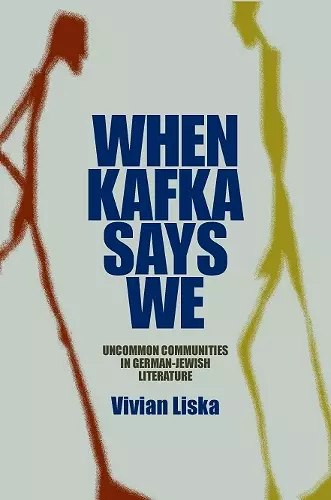When Kafka Says We
Uncommon Communities in German-Jewish Literature
Format:Hardback
Publisher:Indiana University Press
Published:8th Jun '09
Currently unavailable, and unfortunately no date known when it will be back

How literature creates new visions of community
Taking as its starting point Franz Kafka's complex relationship to Jews and to communities in general, this title explores the ambivalent responses of major German-Jewish writers to self-enclosed social, religious, ethnic, and ideological groups. It presents an analysis that uncovers provocative attitudes and insights on a subject of controversy.
Taking as its starting point Franz Kafka's complex relationship to Jews and to communities in general, When Kafka Says We explores the ambivalent responses of major German-Jewish writers to self-enclosed social, religious, ethnic, and ideological groups. Vivian Liska shows that, for Kafka and others, this ambivalence inspired innovative modes of writing which, while unmasking the oppressive cohesion of communal groupings, also configured original and uncommon communities. Interlinked close readings of works by German-Jewish writers such as Kafka, Else Lasker-Schüler, Nelly Sachs, Paul Celan, Ilse Aichinger, and Robert Schindel illuminate the ways in which literature can subvert, extend, or reconfigure established visions of communities. Liska's rich and astute analysis uncovers provocative attitudes and insights on a subject of continuing controversy.
Taking as its starting point Franz Kafka's complex relationship to Jews and to communities in general, When Kafka Says We explores the ambivalent responses of major German-Jewish writers to self-enclosed social, religious, ethnic, and ideological groups. Vivian Liska shows that, for Kafka and others, this ambivalence inspired innovative modes of writing which, while unmasking the oppressive cohesion of communal groupings, also configured original and uncommon communities. Interlinked close readings of works by German-Jewish writers such as Kafka, Else Lasker-Schüler, Nelly Sachs, Paul Celan, Ilse Aichinger, and Robert Schindel illuminate the ways in which literature can subvert, extend, or reconfigure established visions of communities.
-- Joseph Haberer * SHOFAR *[T]his is a collection of . . . work dealing with exemplary 20th-century Jewish authors, poets, and thinkers who wrote, or are still writing, in German—including (in addition to Kafka) Theodor Herzl, Else Lasker-Schüler, Paul Celan, Nelly Sachs, Ilse Aichinger, Robert Menasse, Doron Rabinovici, Robert Schindel, and Hannah Arendt. . . . Looking at the sociocultural and political context of the 20th century, Liska . . . proffers nuanced, insightful, often provocative interpretations of selected works of interest to scholars of these particular writers. She explores how these German-Jewish writers' responses to anti-Semitism, along with their ambivalence about their marginal position, inspired 'unconventional literary approaches toward communities and selves and the relationship between them.' Keying on this level of ambivalence, Liska convincingly shows how these particular works . . . can unmask, subvert, but also reconfigure the 'oppressive cohesion of communal groupings' into new 'original and uncommon communities.' . . . Recommended. — ChoiceNovember 2009
This book convincingly demonstrates a fruitful intersection betwen literary analysis and cultural studies to raise important questions about German Jewish identity and literature and would be a valuable read for those interested in German Jewish studies, Holocaust remembrance, and cultural studies as a whole. July, 2010
* H-Judaic, H-Net Reviews *Several essays here deserve to become important reference points in literary discussions. Spring 2011
* Journal of Jewish Studies *Liska has produced a fascinating volume ...34/2 May 2011
* German Studies Review *[T]his is a convincing and remarkable study, focused, yet of impressive breadth. . . . [S]hould be a mainstay in every university library offering German Studies or Jewish Studies on the graduate or undergraduate levels.Vol. 29, No. 3 Spring 2011
* ShofISBN: 9780253353085
Dimensions: unknown
Weight: 549g
256 pages